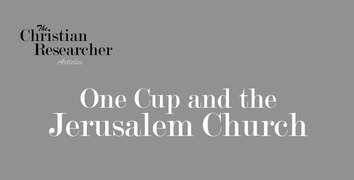ARGUMENT #55:
The church at Jerusalem was too large to use just one cup. A plurality of cups had to be used to serve such a large congregation.
REPLY:
1) This contradicts the idea that a drinking vessel is an incidental item. In effect, the present argument is saying a drinking vessel is essential and in fact a plurality of cups are essential under some circumstances. Here are the conclusions of this argument:
- Drinking vessels that are unnecessary are now necessary.
- An expedient item now becomes essential.
- A liberty now becomes mandatory.
2) This argument assumes there was only one congregation in the Jerusalem vicinity. For this argument to work there could not have been a congregation at:
- Bethany
- Bethphage
- Bethlehem
- Jericho
- Emmaus
All of these cities were within walking distance from Jerusalem. If there were congregations in all these cities, counting Jerusalem itself, there would be six congregations within walking distance. Three thousand disciples distributed among six congregations would make 500 people per congregation - an audience small enough to use a single cup.
- If there were any "country churches," the number of people per congregation would decrease even more.
- If some of these cities had two or more congregations, then the number of people per congregation is decreased even more.
- It would have been possible to have had 12 congregations within walking distance of each other. One apostle could be present in each congregation to help conduct services. With 12 congregations in the area, each congregation would have on average only 250 people present a crowd small enough that one cup could easily be used in communion.
There is scriptural authority for having more than one congregation within a city, but there is no authority for having more than one cup on the Lord's table.
3) Besides assuming there were no other congregations within walking distance, this argument assumes that all 3000 members of the church met in one massive assembly for communion.
It is very doubtful that a Jewish controlled city would have allowed a massive assembly by Christians to eat the Lord's supper in honor of Jesus whom they had just crucified. Human assumptions that 3000 Christians met in a single assembly to eat the Lord's supper is not proof of anything. Assumptions prove nothing in a civil court of law and they prove nothing from the Bible.
4) In the days of Moses, although one congregation was spoken of, the Passover meal was eaten in small assemblies inside brethren's houses.
Exodus 12
3 "Speak to all the congregation of Israel, saying: 'On the tenth day of this month every man shall take for himself a lamb, according to the house of his father, a lamb for a household.
6 'Now you shall keep it until the fourteenth day of the same month. Then the whole assembly of the congregation of Israel shall kill it at twilight.
This "congregation" of about 2,000,000 people were to "kill it." How did they do this? With one massive assembly? No! By many local assemblies. Each house killed a lamb and each house ate a lamb and in this way the entire "congregation" of Israel "killed it."
How did the 3000 Christians in Jerusalem eat the Lord's supper? In one massive assembly? There is no evidence to suggest this and much to oppose it. However, by meeting in many local assemblies they were able to break bread utilizing a single loaf and a single cup as the Lord directed.
5) This is the same reasoning used by denominations who insist that baptism could not possibly be immersion because 3000 people could not have been immersed in a single day.113
Three thousand could easily have been immersed by having more than one man baptize. In the same way, 3000 people could easily assemble in more than one congregation.
(To pick up a copy of George Battey's book Debate Notes on Individual Cups click HERE.)
In The Cup of the Lord: With A Review and Reply, Brother Ronny Wade answers the same argument originally posed by G. C. Brewer:
In his review of The Cup Of The Lord, by J.D. Phillips brother G.C. Brewer stoutly affirms that the size of the Jerusalem church was such that it would have been impossible for one cup to be used in the distribution of the fruit of the vine, hence it is all right to use a plurality of cups in the communion. He then asks “But where does the Bible say that any one church ever used only one cup?”
The answer to that question is found in 1Corinthians eleven. Verse two says “Now I praise you brethren, that you remember me in all things and keep the traditions just as I delivered them to you.” Then in verse twenty-three while addressing the observance of the Lord’s Supper he says “For I received from the Lord that which I also delivered to you that the Lord Jesus on the same night in which He was betrayed took bread,” verse 25 “In the same manner He also took the cup after supper saying, This cup is the new covenant in my blood. This do, as often as you drink it, in remembrance of Me. For as often as you eat this bread and drink this cup, you proclaim the Lord’s death till He comes.”
Here is a congregation that had problems in the observance of the communion, but nothing is said that indicates they had changed the number of drinking vessels used. In fact Paul commands them to “keep the traditions just as he delivered them.” What does he deliver? “That the same night in which He was betrayed he also took the cup…” So, if Corinth complied with Paul’s instructions, we have a congregation using one cup.
The question that really needs to be answered is “where in the New Testament did any congregation ever use more than one cup?” We know from the passages describing the institution of the Lord’s supper in Mt. 26:26-29; Mark 14:22-25 and Luke 22:19-20 Jesus used only one cup containing the fruit of the vine from which they all drank. We have also seen that the Corinthian congregation was instructed to observe the same procedure.
Brewer: The author of the tract shows that he knows that the record does not claim that they all drank from one cup, and he also yields to the point that such a thing would have been impractical, if not impossible. He therefore tries to prove that the church at Jerusalem and other places did not all assemble together to partake of the Lord’s Supper, but partook instead in their homes! Thus he scatters them out into dozens or hundreds of groups, and each group, of course, had one cup! They all composed the church at Jerusalem (Acts 15:4), and the whole church assembled or came together to consider circumcision (Acts 15:22), and it was spoken of as “all the multitude (Acts 15:12); but when they came to celebrate that feast which the Lord appointed for his church, they had to disperse and go to their homes, according to our author! When they came to eat the “one loaf” and drink the “one cup,” they had to break up into hundreds of groups, and, therefore, use hundreds of cups -one in each home- to avoid using more than one cup at a place! He has many cups in one city, in one church, but they are not all used in one house. And that makes a big difference in the mind of our author!
But what about the Jerusalem church, was it so large that it was impossible for them to do what Jesus did when he instituted the supper? Was it so large that it was unable to do what Paul commanded the Corinthian church to do? If this was the case why didn’t Paul, who wrote long after the establishment of the church in Jerusalem, recommend a plurality of cups to the Corinthian congregation? Why command that they keep the ordinances as received from the Lord? One would think, from what Brother Brewer wrote that there was only one option left to those in Jerusalem i.e. since the number of converts was so great they had to use multiple cups.
The truth is, there is not one shred of evidence that the thousands of people baptized in Jerusalem ever met in one assembly to observe the Lord’s Supper. Brother Wayne Jackson, who is an outstanding writer among those brethren who use individual cups wrote “Not long after the Jerusalem church was organized, the number of saints in that city numbered possibly 10,000 (see Acts 4:4, which calculates males only). It is highly unlikely that they had an accommodation that facilitated an assembly of perhaps 10,000 believers (not to mention children) in one room.” (Is The Bible Class Arrangement Scriptural? Wayne Jackson) Even Brother Jackson realizes the futility of trying to prove a huge assembly such as Brewer envisions.
Brewer: He says that it was the practice of the early disciples everywhere -Jerusalem, Antioch, Corinth, etc.- to eat the Lord’s Supper in their homes, hence in small groups where one cup could be used. But his zeal for his hobby makes him blind to plain statements of Scripture. At Troas the disciples “came together,” instead of scattering out, to break bread. (Acts 20:7.) Paul tells the Corinthians that they should eat their regular meals at home and then all “come together in the church” to eat the Lord’s Supper. (1 Cor. 11:17-25.) This is just the reverse of what Phillips said they did.
A careful study of the word “church” indicates that it may be used when referring to a number of congregations in a particular area or region. In Acts 9:31 “So the church throughout all Judea and Galilee and Samaria enjoyed peace, being built up; and going on in the fear of the Lord and in the comfort of the Holy Spirit, it continued to increase.” (NASB) Here, the word “church” references a number of congregations in different areas. This may actually be the way the word was used in the early days of the church in the city of Jerusalem. “In a society consisting of many thousand members there should be many places of meeting. The congregation assembling in each place would come to be known as the church in this or that man’s house, (Romans 16:5, 15, 1Cor. 16:19,; Col. 4:5; Philemon v.2” Jamison, Fausett and Brown).
“The oldest meeting places of Christian worship were rooms in ordinary dwellings.” (Schaff-Herzog).
“The places of Christian Assembly were at first rooms in private houses. In large towns, where such a place of assembly could not accommodate all, it became necessary that smaller portions of the community dwelling at a distance should choose other places of their meetings on Sunday.” (Neander, Vol. 1 p. 402).
“At the beginning (of Christianity) the Roman Emperors cared little about Christians. But when their numbers increased, trouble came. The Christians were suspected of forming a dangerous sect organization. When they met privately to observe the Lord’s Supper, it was thought they plotted against Caesar.” (Mace and Tanner, A Primary History for West Virginia Schools p 125).
The truth is, there is no evidence that any congregation in New Testament times ever used a plurality of cups in their observance of the Lord’s Supper. To suggest that the size of the Jerusalem church necessitates such a conclusion is nothing more than a grasping at straws to justify a practice that originated long after the New Testament record.
(To pick up a Copy of The Cup of the Lord: With A Review and Reply click HERE.)


 RSS Feed
RSS Feed
